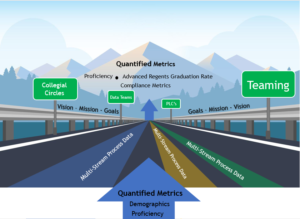How Odds-beating Principals Understand and Make Use of School Data
By Aaron Leo, Kristen C. Wilcox, and Lisa Cala Ruud
How do high school principals use data to make decisions? Dr. Lisa Cala Ruud explored this question in her recent dissertation study based on the NYKids College and Career Readiness Phase 1 Study. Drawing on interviews, surveys, and document reviews, Cala Ruud focused on three secondary schools with above-predicted graduation rates in her analysis. Cala Ruud shows how these principals creatively use data to address increasingly complex challenges in their schools.
Data and Education Policy
Policymakers, district and school leaders, and front-line educators have increasingly relied on data to monitor school, teacher, and student performance. At the national level, The Elementary and Secondary Education Act of 1965 (ESEA), No Child Left Behind (NCLB), and more recently, the Every Student Succeeds Act (ESSA), have all encouraged educators to use data to improve the quality of instruction and promote equity. Despite the emphasis on the import of data use, all data are not equal in their utility and all schools are not set up to use data in the same ways.
Odds-beating School Principals’ Approaches toward Data: Three Lessons Learned
In analyzing NYKids data, Dr. Cala-Ruud identified three overarching themes regarding principals’ use of data.
Theme 1: Principals Prioritize Data Collection with Two Main Purposes:
Purpose 1: Creating aligned and coherent structures that reinforce the district’s core mission and values
Purpose 2: Using data to engage in continuous improvement activities responsive to identified student support needs

Some of the ways they do this is by encouraging the use of collegial circles, data teams, and PLCs.
Theme 2: Principals Communicate Data and Use Data to Promote Organizational Learning
Cala Ruud also identified that routine data-informed communications are essential for converting data to evidence of areas for improvement.
We have a whole entire, once a month, all administrative meeting. I meet with just the supervisors in central office and the directors…and then I have a secondary administrator’s meeting and an elementary administrator’s meeting. So, we’re constantly cycling all of the agenda items through that whole group in a series, month after month to keep continuity going with whatever we’re doing and making sure everybody understands where we are in the process.
– Superintendent, Port Chester
Theme 3: Principals Adjust Their Leadership Styles and Management Approaches to School and Community Demands

Cala Ruud also found that odds-beating principals’ abilities to utilize data rely on a collaborative leadership style which explicitly makes clear an expectation that the school system’s mission and core values should be adhered to in the conduct of one’s educational practice. She also found that the leadership style utilized by principals at odds-beating schools fostered a culture in which the use of data was seen as a preferred means for ensuring high performance and better graduation rates.
It’s all about our at-risk students. It’s all about the plan. What is your plan? Have you spoken to the teachers? Have you spoken to the parents? Did you bring the parents in? It is we are the gatekeeper. We never want them [students] to slip through the cracks. The bottom third is our responsibly and our responsibility is to become an advocate for them, being parent-like for them and being a counselor to them and get them to where they need to be.
– Principal, Malverne
The Continued Significance of Data
It is certain that school data will continue to play a significant role for educators seeking to improve student outcomes as well as for policymakers who rely on data to evaluate and monitor school performance. Dr. Cala-Ruud’s findings can be explored in more detail in her presentation.
Learn more about how odds-beating schools work at our Research Results page and continue to visit our Blog page for new updates. Please reach out with any comments, questions, or suggestions at nykids@albany.edu, and be sure to follow us on Twitter and Facebook!
Tag:odds-beating, school data
